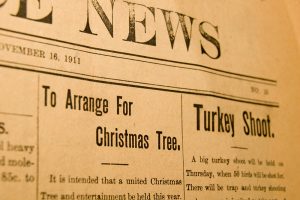Online newspapers – amazing genealogy resource
 You can use newspaper databases to find genealogical information such as birth, marriage and death records, obituaries and probate cases. You may also find interesting information about your ancestors. In the past newspapers published all kinds of news local, national and international stories. Because they printed almost everything happening in a community, newspapers are a treasure trove of information about people's daily lives.
You can use newspaper databases to find genealogical information such as birth, marriage and death records, obituaries and probate cases. You may also find interesting information about your ancestors. In the past newspapers published all kinds of news local, national and international stories. Because they printed almost everything happening in a community, newspapers are a treasure trove of information about people's daily lives.
Beginning your newspaper research
Go to our popular genealogy tools to find free databases and other helpful genealogy resources. Unfortunately, not all newspapers are available to search digitally. If you don't find the town's newspaper you need, broaden your search to the county or regional area. My dad grew up in very small towns without newspapers, however, the county seat's newspaper covered those towns. In a 1922 newspaper I found a story about my grandfather's car being stolen from his garage. It was just a couple of sentences long, but it was a fun find. Looking at old newspapers gives insight into a moment in time. Allow yourself plenty of time to be immersed in that moment. There is an immediacy. You almost feel like you are there and could discuss the news of the day, the weather, gossip, society happenings and advertisements with your ancestors. You gain insight into their daily lives and learn their stories. For me that is what genealogy is about the facts and the stories that created you.The library has the sources you need to research your family no matter where they lived.
Looking at old newspapers gives insight into a moment in time. Allow yourself plenty of time to be immersed in that moment. There is an immediacy. You almost feel like you are there and could discuss the news of the day, the weather, gossip, society happenings and advertisements with your ancestors. You gain insight into their daily lives and learn their stories. For me that is what genealogy is about the facts and the stories that created you.The library has the sources you need to research your family no matter where they lived.
Potential research roadblocks
Digitizing newspapers is a long and expensive process so not all newspapers have been digitized. Additionally some copyright holders will not release the digital rights. An example of this is Topeka's major papers are only available from the 1870s through 1922. From 1923 to the 2000s, the papers are not digitally available, and there isn't a general index. We have a limited Newspaper index for the Topeka Capital-Journal. It is keyword searchable and contains articles and events for the years 1989-1999. It can be very difficult to find an article in these papers without a specific date.
Digital newspaper sources

The full list of our library's newspapers includes the New York Times (1851-2011), USA Today and news from around the world. Heritage Hub is a comprehensive newspaper collection of obituaries and death notices (1704-present) with an easy-to-use interface that covers all 50 states and territories. If you are looking for local obituaries, check out our Obituary Index. This index covers Topeka newspapers from 1906-present. The obituaries are not digitized, but the index will give you the name and date of the newspaper to find it on our microfilm. Here's a little information about our most popular newspaper sources for genealogy researchers.
Newspapers.com
We recently added Newspapers.com Library Edition to our database collection. It's a great resource if you are researching family from other states. This extensive database provides online access to more than 4,000 historical newspapers dating from the early 1700s to the 2000s.
As I mentioned earlier, historic newspapers covered everything. You can learn who was visiting from out of town or who motored into the city to work or shop. These papers also reported crime, the price of goods, national news, local news, obituaries and school events. Researching my grandfather I found the local paper reported names of students who did well in school each quarter. I found his and his brothers' grades when they were in elementary school.
NewsBank
NewsBank is a great source for researching recent articles and obituaries. This database has more than 12,000 searchable titles that include newspapers, blogs and videos. NewsBank has national and state newspapers. The Topeka Capital-Journal is available in two editions. The text edition has more years available, but not every article carried over due to copyright reasons. Coverage for the text edition is 2001-current. I prefer the image edition that looks just like the newspaper. Everything published in an issue is available. The coverage for the image edition starts in 2017. We also have access to the text and image editions for the Kansas City Star and the Wichita Eagle. All the sources available in NewsBank are keyword searchable, making research much easier.
Other sources
 If you are researching your Kansas family, Kansas Digital Newspapers from the Kansas Historical Society is a great source. KHS archives have newspapers from across the state. Kansas Digital Newspapers is a collaboration between public and private partners to digitize Kansas newspapers. This makes them readily available to researchers, genealogists, historians and anyone who wants to experience Kansas history. Newspapers from 1922 and older are digitized and are keyword searchable. If you are looking for articles and obituaries from 1923-current, you may need to contact the historical society or the local public library to access their microfilm. Chronicling America is a free website that allows you to search America's historic newspapers from 1777-1963. It is very similar to Newspapers.com. You can search for articles and obituaries, but this site doesn't have the same extensive coverage as Newspapers.com. A fun example of the kind of articles you can find is a published letter from General George Washington to his wife on January 1, 1778, in the Newport (RI) Gazette. Chronicling America is sponsored jointly by the National Endowment for the Humanities and the Library of Congress.
If you are researching your Kansas family, Kansas Digital Newspapers from the Kansas Historical Society is a great source. KHS archives have newspapers from across the state. Kansas Digital Newspapers is a collaboration between public and private partners to digitize Kansas newspapers. This makes them readily available to researchers, genealogists, historians and anyone who wants to experience Kansas history. Newspapers from 1922 and older are digitized and are keyword searchable. If you are looking for articles and obituaries from 1923-current, you may need to contact the historical society or the local public library to access their microfilm. Chronicling America is a free website that allows you to search America's historic newspapers from 1777-1963. It is very similar to Newspapers.com. You can search for articles and obituaries, but this site doesn't have the same extensive coverage as Newspapers.com. A fun example of the kind of articles you can find is a published letter from General George Washington to his wife on January 1, 1778, in the Newport (RI) Gazette. Chronicling America is sponsored jointly by the National Endowment for the Humanities and the Library of Congress.
Newspaper research can bring your ancestors' stories to life, fleshing out the facts, and giving you insight into to their lives.













